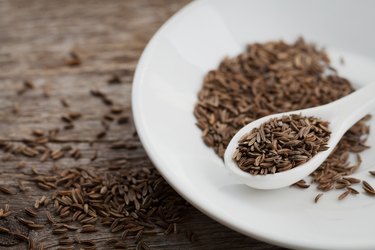
Ground cumin and whole cumin seeds are commonly used to add flavor to foods, especially in Indian, Middle Eastern and North African cooking. Allergies to cumin and other spices are relatively rare, but can develop in older children and adults. If you are allergic to cumin, you may also react to related foods, such as coriander and dill, or have a pollen allergy. It can be difficult to avoid cumin, since it is often mixed with other spices in food.
Causes
Video of the Day
If you're allergic, your body overreacts to a protein, profilin, found in cumin and other foods and spices. It does not matter whether it's ground cumin or cumin seeds. Your immune system reacts by producing Immunoglobulin E, an antibody and histamine. Because cumin is a member of the parsley family, you're likely to react to related foods such as carrot, celery, dill, anise, cumin, coriander and caraway. The reaction also has been linked to mugwort and birch pollen allergy, according to a 1997 report in the journal "Clinical and Experimental Allergy," which cited a study by researchers at the Institute of General and Experimental Pathology. For this reason, you may find that your symptoms are worse during late summer.
Video of the Day
Symptoms
Symptoms usually occur shortly after eating cumin, although you may have a skin rash after simply touching the spice. You may have an itchy, tingly mouth, lips and throat and a swelling of your lips and tongue. Other symptoms include sneezing, a runny nose and itchy, watery eyes. Some people have more severe symptoms, including vomiting, abdominal cramps and diarrhea. In rare cases, anaphylaxis -- a severe, life-threatening reaction -- occurs. If your throat swells, you have trouble breathing, a sudden drop in blood pressure or a weak, rapid pulse, seek emergency medical attention.
Tests and Diagnosis
If you suspect you're allergic to cumin, talk to your doctor and describe your symptoms. It can be difficult to pinpoint the cause, and keeping a food diary can help. You'll probably be asked to take a skin or blood test. In a skin test, your skin is pricked, injecting a tiny amount of allergen below the surface. If you're allergic, a rash develops. In a blood test, a sample is tested for the presence of antibodies, your body's reaction to an allergen.
Treatment and Drugs
Your doctor may prescribe oral antihistamines or topical corticosteroids to relieve your symptoms. You can also buy these over the counter at most drugstores. If your allergy is linked to hay fever, allergy shots or immunotherapy can help. If you're at risk of anaphylaxis, you'll probably be advised to carry an epinephrine auto-injector at all times. Inject this into your thigh at the first sign of a serious reaction, then go directly to an emergency room. Make sure your friends and family know how to use the injector as well.
Prevention
The best way to prevent an allergic reaction is to avoid cumin and other spices and foods that trigger your symptoms. Check ingredient lists carefully, and ask detailed questions in restaurants. Remember that ground cumin is often an ingredient in curry powder, taco seasoning and other spice mixes.